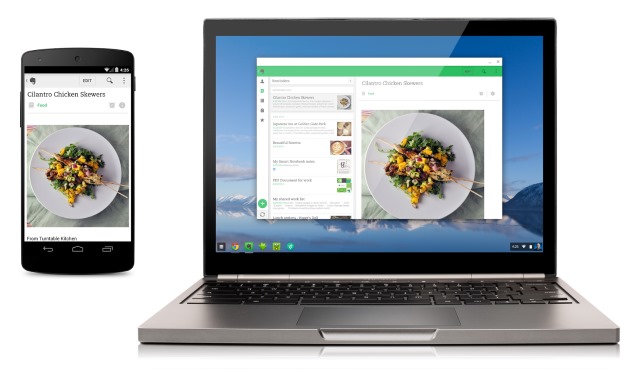
Parlez-vous l'internet? Google Translate gains new Chrome extension
The web is truly worldwide, the epitome of globalization and the ever-shrinking world. As much as the McDonaldization of the world means that cultures are on an homogenizing course, there are still plenty of differences to embrace -- language is one of them. Spend just a little time surfing the web and there's a reasonable chance that you'll encounter a foreign language site, or at least a few words and phrases that are beyond your high school French and Latin.
Enter stage right Google Translate. This service of course n'est pas nouveau. In fact Google Translate has been around for ages. Mais maintenant il y a un Chrome extension that makes the translation process easier than ever. Oubliez visiting a dedicated website, now your translation is a mere click away.

Find a bug in Chrome? You could earn $15,000 and entry into the Google Hall of Fame!
There are award shows for everything nowadays, celebrating actors, athletes and more. However, computer nerds do not get the credit they deserve; we should get an award show too, right? Hell, they should give out trophies for fixing family members' computers. I have spent hours at my Uncle Roy's smelly house removing malware, only to leave with not so much as a thank you.
Don't worry though, Google cares about your nerdy endeavors -- if it helps the Chrome browser, that is. You see, the search giant is increasing the maximum bounty for finding bugs in the browser to $15,000. While money is awesome, the recognition may be equally cool, as your name may be added to the Google Hall of Fame!

You can now mute audio in Chrome with a single click
Have you encountered situations before where audio suddenly starts to play in your web browser of choice without you clicking on a play button? This can be extremely frustrating, especially if you have opened multiple sites in rapid succession.
It happens because websites start to autoplay audio, either in the form of an embedded video or audio file, when a site gets loaded in the browser -- even if it is not the active tab.

Get Google Chrome working again with this tool
Your browser's misbehaving? It's a common problem, and you've probably got your own quick fixes: delete the cache, scan for malware, remove the last add-in you installed, whatever it might be.
Now Google is offering a little extra assistance with Chrome Software Removal Tool (CSRT), a Windows beta which scans for programs known to cause problems with Google Chrome and offers to remove them.

Android apps break out of the small screen and jump to Chromebooks
A lot of Google services have transitioned to gain the title of "apps", and the same is true of a large number of extensions for the Chrome browser. These online tools are essentially cross-platforms apps that work identically Now Google is taking another step to break out of the confines of making apps available to a single platform. Android apps are, quite rightly, associated with smartphones and tablets, but now a small number of these mobile apps are finding their way onto Chromebook.
The (usually) cheap and cheerful Windows laptop/Mac Book alternative (did someone say netbook?) can now start to benefit from a handful of well-known titles from Android devices. It is very early days but as of today there are four Android apps available to Chromebook owners -- Duolingo, Evernote, Sight Words, and Vine -- but we can expect to see this list expand over time. The quartet of crossover apps were introduced today by Ken Mixter and Josh Woodward. A short blog posts penned by the pair explains that the Chromebook support comes thanks to the App Runtime for Chrome (Beta) project.

OneDrive file size limits jumps to 10GB, while syncing, sharing and uploading improve
A couple of weeks ago it looked as though Microsoft was lifting the 2GB file size limit for OneDrive users. Although no announcement was made, some users of the cloud storage service found that they were able to sync files larger than 2GB. Now, the increase in supported file size is official. OneDrive users can now upload files up to 10GB in size, bringing Microsoft's service in line with Dropbox and Google Drive. This is the latest example of Microsoft responding directly to user feedback, specifically a UserVoice thread in which users called for the 2GB file size limit to be banished.
Today Jason Moore, Group Program Manager of OneDrive, responded to the demands with a simple message: "We're proud to announce OneDrive now supports up to 10 GB files". While this is not quite the unlimited file size some people were looking for, it is a big improvement and something that will be widely welcomed. Considering the free version of OneDrive offers 15GB of storage, it is now possible to fill up your account with just two files. If you're an Office 365 customer with access to 1TB of space, you'll need to upload at least 100 files.

Google Chrome is to blame for a massive increase in online ad blocking
A shocking new report looking at online advertising shows that there has been a huge increase in the number of internet users making use of ad blocking tools. The report describes ad blocking as having gone mainstream, but it also suggests that the loss of ad revenue threatens the life of many websites.
Pagefair worked with Adobe putting together the report and found that 4.9 percent of internet users make use of ad blockers, including more than a quarter (27.6 percent) of those in the US.
Chrome 38 Beta makes user-switching feature more visible, adds 64-bit support to OS X and Windows
Google has updated its Chrome Beta channel with the release of Google Chrome 38.0 Beta. The new release, also available as Google Chrome 38.0 Beta (64-bit) for Windows and Linux, has two major highlights.
The first is an improved -- and more visible -- way of managing and switching between multiple Chrome user profiles, while the other sees 64-bit support extended to the OS X platform.

Chrome to start protecting users from additional malicious downloads
Google’s Safe Browsing service protects users from malicious websites and warns against potentially dangerous downloads in Chrome. According to Google, over three million download warnings are being viewed every week, and because it’s available for other browsers, this technology is helping to keep 1.1 billion people safe.
From next week, Google says it will be protecting users from additional malicious software, delivering warnings whenever you attempt to download something that might try and make unwanted changes to your browser or computer.

Google Chrome launches into space with 'A Spacecraft for All'
Google seems to be on a bit of a space travel kick lately. The search-giant recently launched Google Maps for Mars and the Moon. At first, that seemed a bit odd; I mean, other than some NASA nerds, who really cares to view those terrains? Before you raise your hand and say you do, please know I did it extensively as a test, and saw nothing but rocks and craters. Quite frankly, I would sooner explore Dollywood; at least there is something to see.
Sure enough though, Google seems committed to space, as today, the company announces that users of Google Chrome can get involved with ISEE-3. Don't know what that is? I didn't either. Google explains it by saying, "originally launched in 1978 to study the Sun, it was the first spacecraft in the world to fly by a comet and has been orbiting the sun for billions of miles since 1986". Damn, it's been travelling since the last time the Mets won the World Series!

Chrome's All Seeing Eye searches the text of every page you’ve visited
You’ve been online for hours, Chrome windows and tabs scattered everywhere, and now you need to revisit a particular page. Which would be fine, except you can’t remember which one it was, and the standard web history -- just titles and URLs -- doesn’t help at all.
Maybe you should have installed All Seeing Eye, a Chrome extension which takes a snapshot of every page you visit, indexes its text, and makes this freely searchable whenever you like.

Google Chrome 64-bit Beta arrives, edges closer to final Windows release
Google has moved its dedicated 64-bit Windows build of Chrome one step closer to its final release with the launch of Google Chrome 37.0 Beta (64-bit). The new release requires Windows 7 64-bit or later to run.
The new build, which is also available in 64-bit form for Linux, moves to the beta channel, but despite media speculation, users should not assume a final release is just a few weeks away – it could yet be months before Google deems the build is stable enough for general consumption.

Are you Bing-curious? Microsoft's search engine comes to new tabs in Google Chrome
Bing is a wonderful search engine. My love for it is hardly a secret, as I declared my affection earlier today. However, while Internet Explorer is getting better all the time, Chrome is still my preferred browser on Windows, Linux and OS X. Unfortunately, using Bing as the default search engine on Chrome just felt wrong. I pictured Google employees spying on my web activity and shaking their heads in disappointment at my horrible crime.
Of course, that is not really happening (I hope), but still Bing on Chrome felt out of place and third-rate in comparison to Google. Today, this changes as Bing comes to new tabs in the Chrome browser.

Do Not Track is bolstered by EFF's Privacy Badger extension
Online security and privacy are hotter topics than ever. Just this weekend, Edward Snowden made an appearance at the Hope X 2014 hacker event, and called for those in attendance to help make encryption tools easier to use. Another fierce advocate of online privacy is the EFF (Electronic Frontier Foundation), and today the group released a beta version of Privacy Badger, a beautifully named extension for Chrome and Firefox designed to stop a number of tracking techniques used online. The idea of tracking cookies is something that will be familiar to most, but tracking takes many forms, including advertising and social media. Privacy Badger aims to block this tracking.
Peter Eckersley, EFF Technology Projects Director, said: "Widgets that say 'Like this page on Facebook' or 'Tweet this' often allow those companies to see what webpages you are visiting, even if you never click the widget's button. The Privacy Badger alpha would detect that, and block those widgets outright. But now Privacy Badger's beta version has gotten smarter: it can block the tracking while still giving you the option to see and click on those buttons if you so choose".

Banish annoying 'allow fullscreen' messages in Google Chrome
You know those annoying messages that say "Press ESC at any time to exit fullscreen. Allow fullscreen?" Here's how to never, ever see those again.
To stop the messages, simply head to Google Chrome's "content settings" section of the settings tab, scroll down to Fullscreen and click "Manage exceptions". Or you can just copy chrome://settings/contentExceptions#fullscreen into your address bar, if you don't want to go rummaging through all the confusing settings.
